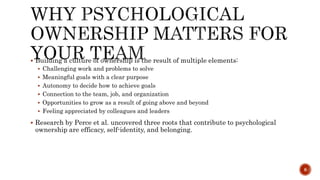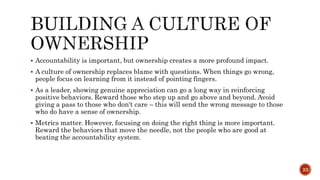The document discusses the differences between accountability and ownership. Accountability is external and involves being responsible for meeting goals and responsibilities set by others. Ownership is intrinsic and involves feeling personally committed to the success of a project or task. The document provides strategies for building a culture of ownership, such as giving employees autonomy, connecting their work to meaningful goals, and ensuring they understand the reasons or "why" behind their work. It also discusses how accountability should focus on behaviors rather than just outcomes.























